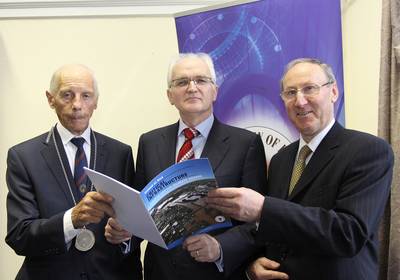Alan Cooper, IAE, Edwin Poots MLA, Minister of the Environment, Michael Hayden, President IAE and Naomi Long MLA, Lord Mayor of Belfast at the launch on the 2nd December 2009 at the Lagan Weir Belfast of the report Critical Infrastructure – Adaptation for Climate Change.
Polluted drinking water, flood damage and power black outs
How climate change threatens our critical infrastructure
Even if we cap greenhouse gases at 2000 levels, climate change will have a major impact in the coming decades due to inertia in the climate system.
We need to adapt our critical infrastructure which is at risk from climate change and to ensure that any new infrastructure is future proofed.
Just some of the practical and immediate measures recommended in a hard-hitting expert report on the threats climate change poses to our water and energy supplies and, through floods, coastal erosion and storm surges, to our towns and cities.
Failure to act now will put our society and economy at an unacceptable risk, according to the Irish Academy of Engineering (IAE), which prepared the new report. Acting now, the Academy says, will be far more cost effective than waiting for catastrophe to occur.
“You’ve only to think of Hurricane Katrina”, warns IAE president, Michael Hayden, “for an example of how climate change coupled with poor planning and zoning decisions can lead to social and economic disaster”.
The report says that if we don’t take urgent action to strengthen adversely affected critical infrastructure the following will happen:
Changing rainfall patterns: will affect water supplies
Rising sea levels: will inundate coastal cities and towns
Severe weather incidents: will damage energy installations, hospitals, telecommunications, railways and other critical infrastructure, and contaminate water supplies.
The report, entitled ‘Ireland at Risk: Critical infrastructure – adaptation for climate change’, argues that ‘adaptation’ to the uncertain future is now urgent in Ireland as elsewhere.
The 40-page analysis emerged from keynote submissions and discussions involving over 60 researchers, engineers, scientists, policy experts and administrators from north and south, and it will be launched in Dublin on Wednesday, November 18, by Mr John Gormley, Minister for the Environment, Heritage and Local Government.
The social and economic wellbeing of the island is dependent on the continuous availability of infrastructure and urgent action is required given the long lead times required to plan, design and construct infrastructure.
The report addresses adaptation issues in the three key infrastructural areas on which our modern society depends entirely:
reliable water supplies
robust flood defences, and
dependable energy supplies.
In all, the report makes 18 key recommendations for action. Significantly, most of the recommendations do not involve any immediate capital expenditure, but deal with the institutional steps needed to ensure the problem is tackled effectively and economically.
Key recommendations include:
Assign clear responsibility for the protection of critical infrastructure to an existing government department or agency.
Plan the protection of coastal cities at risk from rising sea levels and storm surges.
Establish Water Resource Authorities in Northern Ireland and the Republic to manage the island’s available water resources. Introduce universal water charging to reduce wastage of a precious resource.
Restrict development on floodplains.
“If we move now, significant economic benefits will accrue”, according to Michael Hayden, “but it we do ‘too little too late’ we risk social and economic disaster”.
The Report is available below or from the Publications page

Michael Hayden, President IAE, John Gormley TD, Minister for the Environment and Alan Cooper, IAE, at the launch on 18th November 2009 at the Custom House Dublin of the report Critical Infrastructure – Adaptation for Climate Change.
Related Documents
Critical Infrastructure – Adaptation for Climate Change
It is now widely recognised that Ireland must adapt to the impacts of climate change. The engineering profession will play a central role in identifying the climate change challenges facing us across the island, and in proposing and implementing appropriate and cost-effective adaptation measures. This report focuses on the key adaptation strategies needed for critical infrastructure, specifically: energy supply, water services and flood alleviation. Our aim is to ensure that the engineering profession contributes fully in formulating policy and in planning for the potentially dramatic developments expected over the coming century.
Critical Infrastructure – Adaptation for Climate Change – Water Supply April 2009
Water is the key to the survival of all human, animal and plant life on this planet. It has the ability to mix with some substances, to corrode others, to operate as a vapour, liquid or solid, and at the same time has extraordinary self-cleaning properties, yet we in Ireland usually take water for granted. That situation will alter, however, as climate change takes effect, and we come to recognise water for the liquid gold it is. As a result, the conservation, use, demand and treatment of water have to be given the most careful consideration in order to ensure a sustainable environment.
Critical Infrastructure – Adaptation for Climate Change – ICARUS Keynote April 2009
Work on climate change in Ireland to date has been successful in refining the likelyimpacts of climate change over the course of the coming century. However, significantuncertainty and challenges remain and it is essential that researchers in this critical areawork closely with end-users of data to ensure best possible information is used fordecision making and designing for the future. While acknowledging the uncertainty thatremains the following is a summary of likely changes in key parameters.
Critical Infrastructure – Adaptation for Climate Change – Flood Protection Infrastructure Keynote April 2009
Typically Critical infrastructure is a term used by governments to describe assets thatare essential for the functioning of a society and economy. Most commonly associatedwith the term are facilities for electricity generation and transmission,telecommunications, transportation, water supply and public health services.
Critical Infrastructure – Adaptation for Climate Change – Energy Infrastructure Keynote April 2009
Every day, we hear of new initiatives in the energy sector to mitigate climate impacts. Whilemajor changes are underway in energy infrastructure, little attention has been given to climateadaptation.

